Theatres of Authenticity
 The Story So Far
The Story So Far
In using ultimate values-R"G1 you necessarily use humanity's 7 vehicles of goodness. However …
… goodness is limited by and releases inner strength.
In finding strength-R"G2, you conscientiously use humanity's 6 mantras of self-control. However …
… self-control is both limited by and releases pain and suffering.
In overcoming pain-R"G3, you spontaneously use humanity's 5 techniques of healing. However …
… healing is limited by and releases character.
In building character-R"G4, you thoughtfully use humanity's 4 theatres of authenticity.
Now read on ...
Features of Authenticity
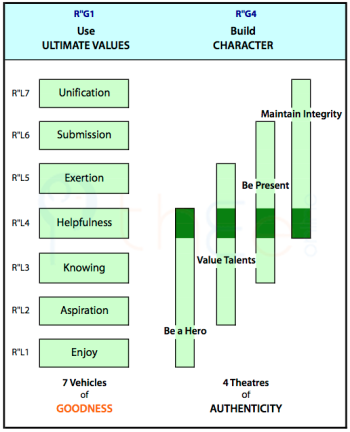
When life is easy, little is demanded of you. That is why your character gets built through difficulties and adversity. If you are lucky, you deliberately bring most stress on yourself through rising to a challenge.
Each of the four ways that you build character provides for a different manner of revealing authenticity. Authenticity confirms that the character you show is not simply a coat that you put on and take off expediently or to win the approval of others. Your personal growth requires that you develop your self so that you cannot be other than you are.
I examine below each of the four theatres of authenticity in terms of:
- benefits that accrue to the social milieu;
- internal structure that constitutes the process;
- courage that must be shown;
- temptations that must be faced.
Remember that «functioning in daily life» is the frame of reference, not some extreme situation or hypothetical moral quandary.
Maintain Integrity-R"G44
Maintaining integrity is about being consistently true to your better Self at all times and manifesting congruence between what you say and do. (To use the usual formulation, «being true to your self», might sound like egocentricity.) Psychosocial reality is created by what you say and think. So you bear a responsibility for affirming and thereby sustaining and propagating what is right and good.
The requirement here is modest. Integrity simply demands that you speak up when others are being deliberately exploited or harmed, or if the human cost of a choice is being ignored. There is no demand for extremes of daily self-sacrifice, or the impossible prevention of all suffering.
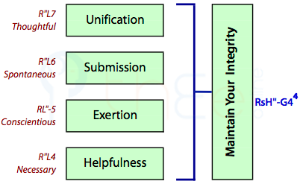
Integrity has an opposite, hypocrisy, in which the affirmation of noble values bears little relation to personal actions. When most everybody values integrity, there will at last be a society fit for human beings to live in. That social benefit, currently a little way off, has to commence with each person's creative efforts as explained here.
 Internal Structure
Internal Structure
g4: Integrity is maintained by a thoughtful unification-R"G17 of your actions and affirmations, your values or principles and your choices, your performance and your expectations of yourself, and yourself with your social environment.
+
g3: It depends on spontaneous submission-R"G16 to a coherent set of intrinsically humane personal principles that provide guidance about right and wrong.
+
g2: Yet active obedience to principles in complex situations is neither automatic nor self-evident. Integrity depends on conscientious exertions-R"G15 to ensure a continuing, appropriate consistency and reinforcement of thought, belief, speech, choice and action.
+
g1: Maintenance of integrity rests on a necessary helpfulness-R"G14 for others, even possibly at some personal cost.
 Courage
Courage
Courage is required to live your life consistently with your highest aspirations, especially when the social milieu, on which you depend, is unsupportive. Taking advantage of others may be accepted or even expected and endorsed, although it is a direct flouting of helpfulness (g1). All too often, societies , including their educational institutions and organizations, are structured in ways that foster lying or manipulative communications—like bluffing or deceiving of others for personal benefit.
, including their educational institutions and organizations, are structured in ways that foster lying or manipulative communications—like bluffing or deceiving of others for personal benefit.
 Temptations
Temptations
Temptations to act in ways that flout integrity are hard to resist when you can benefit without others knowing. Those with high aspirations but weak self-control may cope by avoidance. Temptations of high office make politics and big business common settings for self-indulgence and hypocrisy. Temptations also run high when the culture is hostile to displays of virtue. When that pressure makes it impossible for most people to resist, then a herding tendency—to do what others do—develops and everyone is liable to forget about both authenticity and integrity.
 Other Views of Integrity
Other Views of Integrity
Integrity is used with a variety of meanings and references in psychology, ethics, cognition, arts studies, philosophy, and consciousness studies. It is also used variously in business and marketing contexts.
 Other Meanings ►
Other Meanings ►
- value-orientation:
i.e. as a virtue, or as indicating morality or moral purpose
- formal orientation (i.e. no implication for good or bad)
i.e. indicating an integrated and harmonious functioning of a whole;
or referring to maintenance of a specific identity.
Note that the present use of the term is as a formal name for a particular character-building process with the formula: RsH"-G44 and with properties as defined by the internal structure. All formulations are subject to further inquiry and improvement. The relation of this THEE process to other uses of the term has not been explored. Can you suggest a better name?
Be Present-R"G43
Being present is the prerequisite for acting constructively in a situation. The advice to «be yourself» in a situation is often used as an equivalent. It means participating properly, noticing what is going on, empathizing with others, and being aware of your personal response at all times. Being present is associated with a state of «relaxed awareness», in contrast to being tuned out. It can be continuously active. By being present you will be aware when the situation calls for a time-limited period of more intense «focused awareness».
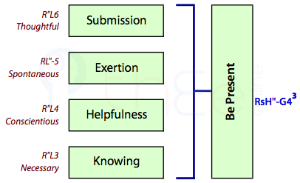
The key social benefit from an authentic virtuous presence is that others are encouraged and helped to be comfortable and constructive i.e. to be themselves. If everybody is «present» in a situation, then interactions will be appropriate and things will go as well as they possibly can. For example: If it is a crowd in a public place, then courtesy will be manifested. If it is a team effort, then the project will move forward well. If it is a social event, then there will be stimulating enjoyable interactions. If it is a risky situation, then the danger is likely to be avoided, prevented, or effectively managed.
a crowd in a public place, then courtesy will be manifested. If it is a team effort, then the project will move forward well. If it is a social event, then there will be stimulating enjoyable interactions. If it is a risky situation, then the danger is likely to be avoided, prevented, or effectively managed.
 Internal Structure
Internal Structure
g4: Being present is enabled by thoughtful submission-R"G16 to the situation in which you find yourself i.e. accepting responsibilities, noticing everyone including yourself, and understanding social pressures and limitations.
+
g3: Your presence depends on spontaneous exertion-R"G15 to enable input, civility, resolution, improvement, a better atmosphere or whatever is appropriate in the situation.
+
g2: An authentic presence reveals a conscientious helpfulness-R"G14 for any individual in need, or for the group as a whole in regard to its goals and values.
+
g1: To be present rests on necessarily knowing-G13 what is going on. That includes knowing your own needs, goals and limitations, as well as the nature of the situation, and the relevant views and feelings of others.
 Courage
Courage
Courage is required to experience whatever a situation may choose to throw at you. You must find a way to participate, often knowing you may be ignored or attacked. You must be open to criticisms or views you disagree with. Perhaps you will have to endure boredom or tolerate unpleasant behaviors.
 Temptations
Temptations
Temptations are also strong here. It is easy to allow your mind to drift off, to let others carry the burden of the group work, to participate in a way that is unnecessarily excluding or hurtful, to avoid noticing those around you, to commit beyond your current capacity. These are simply bad habits: they can and must be resisted and eradicated. When they occur, You can either attend to them, or adjust the situation, or exit.
Value Talents-R"G42
Talents are about innate capabilities and personal aptitudes that feel natural. They are what differentiate people with identical training and experience. Valuing your talent separates you from the crowd. The issue here is less about self-improvement, and more about proper use of a gift from chance or providence. Fortunately, social life requires vast numbers of different talents to suit the myriads of social niches. Within music alone, there may be only six or seven main categories of instrument, but there are thousands of different instruments and musical settings. Each requires a specific talent to extract the greatest beauty for the benefit of others.
there may be only six or seven main categories of instrument, but there are thousands of different instruments and musical settings. Each requires a specific talent to extract the greatest beauty for the benefit of others.
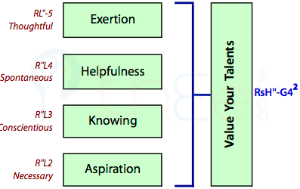
Most of us can discover some special talent within, but unless that talent is properly valued, you won't put in the effort and then find opportunities for its application. If everybody focused on their talent, there would be widespread social benefits. People are happier functioning at their best, and usually blossom further when their talent is recognized and appreciated. But, like charity, valuation begins at home.
 Internal Structure
Internal Structure
g4: Valuing a talent requires thoughtful exertion-R"G15 to enable its proper development e.g. finding the right teachers or mentors, regular intense practice, and seeking out opportunities for use.
+
g3: Valuing your talent enables a spontaneous helpfulness-R"G14 in a way that is appropriate for you and is likely to be recognized and valued by others.
+
g2: Valuing talents entails conscientiously knowing-R"G13 precisely where they lie, and how to develop and apply them so as to be the best that you can be.
+
g1: Valuing talents is based on a necessary aspiration-R"G12 to make the most of them and nurture them as a unique gift.
 Courage
Courage
The first challenge is to actually confront and accept your talent (or talents). It may not be what your parents hoped for or what your society currently values. Then you must follow your star, despite impediments and egotistic preferences for an easy life. Your talent may demand more of you than you might initially want to provide: but this is about building character, so there is nothing for it but to rise to the challenge. Although it is never certain that others will notice or respect you, your talent is a constant in your life. If it is valued, over time it can provide a foundation for living and integrating socially in a positive way.
 Temptations
Temptations
It is natural to take a talent for granted if it comes easily. Then you are not properly valuing it. You have little credit or responsibility for possessing a talent, so you may be tempted to deny or play down your responsibility to value it. Although no-one can take your talent away, you can devalue, waste or even spoil your talent. You may also be tempted to think that your talents give you a prerogative over others: whatever they are, they do not.
Be a Hero-R"G41
Life responds to your creativity. Creativity is based on rising to the challenge. Challenges require courage, and a hero is always courageous. Some challenges are obvious and almost unavoidable e.g. the Journey of the Hero, which is about how you move from childhood to being an adult filling a role in society. However, once you are an adult, what then? Don't worry: there are many more unknowns and difficulties ahead.
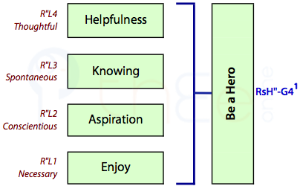
Society benefits from your personal heroism because this sustain its existence. You may possibly share in the opening up of new frontiers, and provide opportunities for others. Why not?
 Internal Structure
Internal Structure
g4: You are a hero through your thoughtful helpfulness-R"G14 for someone other than yourself, and sometimes for a whole group or community.
+
g3: Heroism depends on spontaneously knowing-R"G13 what you have to do in the situation. That is usually provided by your context, social convention, and your own inner goals and aspirations.
+
g2: Being a hero flows from conscientious aspirations-R"G12 to succeed with the current challenge, and then move on and seek greater challenges. Your strength and success benefits any group or community of which you are a part.
+
g1: You flourish as a hero in society through the necessary enjoyment-R"G11 that your adventures provide you—at least most of the time.
 Courage
Courage
In this domain, you must be on the lookout and ready to take up challenges that are presented to you. You must expect stress, fear, hardship. The odds will be against you. Others will be whispering that you will never make it. You will sometimes feel totally alone. However, by bringing your courage to bear, and irrespective of whether you succeed or fail, you will learn about what it is to live, and come through the adventure as a stronger wiser person.
 Temptations
Temptations
Temptations to resist the call to adventure are normal. Just at the critical moment, the cosmos usually invites you to turn back by dispensing shocks or seductions. It is a test. You are far more likely to regret those things you did not do, than those you did. You may be affected by seeing that others hide away, take the easy life, or live off others: parents, an inheritance, the state, a firm. Let them live their life—but are you content to call that living?
Originally posted: 10-May-2013


![]() Other Meanings ►
Other Meanings ►

